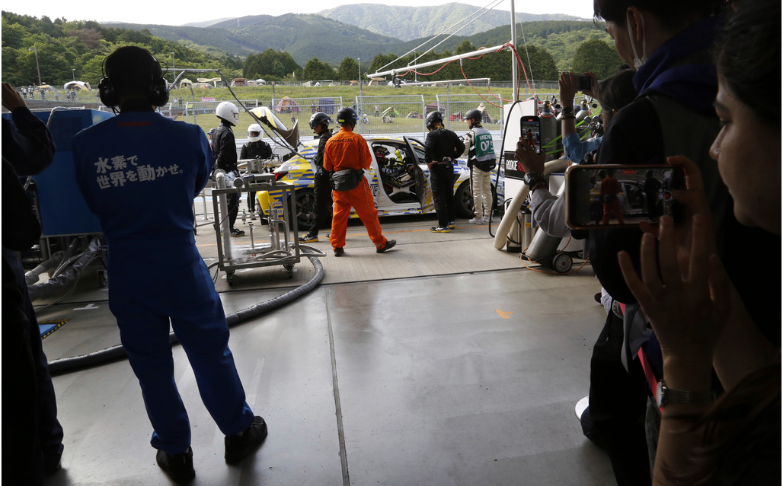Japan and South Korea Deepen Clean Energy Cooperation
A car designed to run on liquid hydrogen, developed by Japan’s Toyota. Clean hydrogen is seen as a potentially potent way to address climate change. (Photo: AP News/Yuri Kageyama)
As threats loom and energy resources grow scarce, Japan and South Korea find themselves increasingly pushed together - despite their historical animus.
This week, information has surfaced that South Korean President Yoon Suk-Yeol and Japanese Prime Minister Fumio Kishida will cooperate in establishing supply chains for hydrogen and ammonia. The pair intend to announce the agreement, as well as complementary deals on semiconductors and quantum technology, through a technology roundtable at the Asia-Pacific Economic Cooperation summit, which will be held on November 17th in San Francisco. Hopes include reducing both Japanese and Korean dependency on energy imports through raising funds via state-backed financial institutions, with the additional goal of incorporating more green energy into both nation’s economies.
Cooperation between South Korea and Japan has been far from the norm historically; in fact, the two countries have often been at odds with each other. During World War II, Japan’s imperial ambitions included the colonization of the Korean peninsula and attempts to wipe out Korean culture. These events, and the atrocities that occurred in the process, have created an enduring bilateral feud, with contentious disagreements over the issue of reparations to South Korea continuing to this day. Proxy disputes have also emerged over electronics trade and Japan’s release of wastewater from the Fukushima nuclear power plant.
However, the supply chain deal is part of a growing trend in the direction of reconciliation. The Japanese and South Korean militaries have deepened their cooperation in recent years, as well as with the United States, conducting joint drills and developing trilateral plans in the face of a rising threat from China. Recently, the nations have also developed a joint information program to monitor North Korean missile launches. This comes alongside other cooperation efforts, such as Tokyo’s lifting of export restrictions for vital restrictions. South Korea’s Yoon has worked to address demands for reparations domestically, and has also explicitly made improving ties between the two nations a goal of his administration, one that Kishida has so far received well.
Japan’s Fumio Kishida (left) and South Korea’s Yoon Suk-Yeol (right) with U.S. President Joe Biden at a Camp David summit meant to foster joint security efforts. (Photo: AP News/Andrew Harnik)
Clean hydrogen is poised to have significant impacts on the green transition, both as a possible clean fuel source and as a way to lessen the climate impact of ammonia production, which has the potential to then co-fire with coal. The agreed-upon framework is intended to encourage dialogue on relative prices and quantities of both nations’ exports, and lead to investment in hydrogen and ammonia production in East Asia and throughout the world. In doing so, the pair hope to strengthen their respective sustainability reputations and to enhance energy security in both nations, thereby bolstering their competitive standing.
As Japan and South Korea step up their efforts to address climate change, they join a growing cohort of nations building green economies. The United States passed the Inflation Reduction Act last year, allocating approximately $400 billion in federal money into green investment across the board. Meanwhile, the European Union continues as a leader in its own right, with its Green Deal encouraging a socially conscious, human-focused transition. Such efforts have led to pressure on China, as a large economy uncommitted to transitioning; many predict that its current supremacy as a dirty hydrogen producer is unlikely to hold up in the face of the global focus on renewables. It is likely that Japan and South Korea’s work to develop cleaner alternatives will only increase the pressure on their counterparts.


